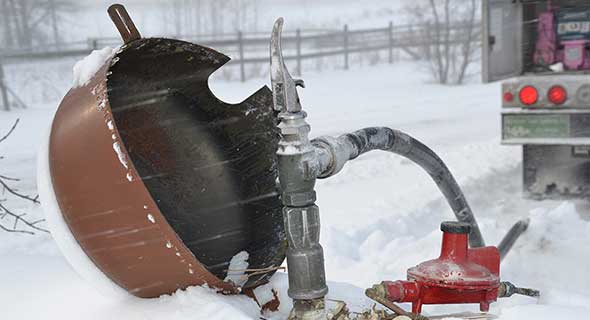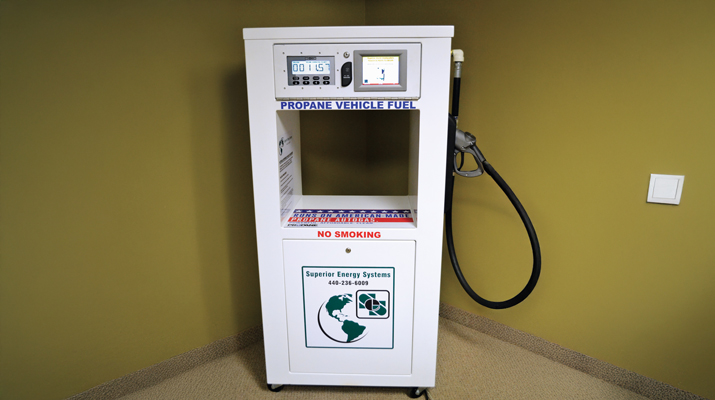Tank locks address safety, liability, tampering concerns
Editor-in-Chief Brian Richesson spent some time this week talking with Lock America CEO and co-founder Frank Minnella about how propane tank locks can strengthen safety in the industry.
Lock America offers an outlet valve lock that is designed to prevent unauthorized reconnections and tampering. The company also offers a fill valve lock that was developed to prevent unauthorized fills and tampering. The locks can be used on stationary tanks and portable exchange cylinders.
LP Gas: The magazine has focused on safety this month. How can propane tank locks help retail propane operations become safer operations?
Minnella: I’ve discovered [several] things. One was a couple of lawsuits after a propane company disconnected and blocked the outlet valve [on a customer’s tank], but the owner of the property went out and easily reconnected the line.
There was one case where the house blew up. The gas company was found 50 percent at fault because they didn’t adequately lock it out or prevent reconnection.
So when you think about the safety aspect, the real safety is a customer cannot reconnect the line unless they destroy the lock. It’s a lot different than putting a little plug in there or a warning label.
In some cases, people even use a plastic seal, which is easy for people to take off. If they have the ability to take that seal or plug out, then you’re liable. The jury is going to come back and say you didn’t prevent them from reconnecting.
If you don’t lock the fill valve, any propane company or a customer could go out there and put something other than propane in that tank. If you’re a propane dealer and that’s your tank, you don’t want someone else being able to put gas of any kind in that tank because your name is on the tank. The company that owned that tank is going to be liable.
The third safety issue is the exchange tanks that are stolen. Today you can go to a [store], cut the padlock on the cage and steal 10 to 15 tanks, and those tanks can be used in a lot of different ways.
LP Gas: What can be done to prevent these types of issues from happening?
Minnella: [Lock America offers] the POLock, our propane outlet lock. We use a tubular key, a round, circular key, which is very popular in the vending industry. That type of key has about 50,000 or 60,000 key combinations.
We issue each dealer their own set. The key used on the outlet lock can also be used on the fill valve lock. When the serviceman goes out to fill the tank or lock out the customer, he has two locks with him. He disconnects the line, puts the POLock in and takes the cap off the fill valve and uses the locking cap. He can lock up both.
Because a lot of these customers, if they don’t pay their bills they will call another company and say, “I’ll pay you cash.” So company XYZ comes in and fills company ABC’s tanks, and the customer himself tried to remove the outlet valve and reconnect it. If he’s successful, nobody’s the wiser.
The companies we work with say their revenues increased because someone else was filling their tanks. We also make a line of padlocks. If you’re a dealer who does exchange tanks, as well as commercial and residential tanks and has cages, we can put the same key code on the padlock used on the exchange tank.
LP Gas: What led to Lock America’s entry into the propane industry?
Minnella: The whole thing started five years ago. I have a 5-acre property and a big propane tank, and I ran out. I had a leak. I don’t know how I got a hairline crack in my outlet line. I imagined to myself: Suppose ABC propane company filled [my regular supplier’s] tank and while doing that tripped on the outlet line or dropped a wrench and put a crack in it. Nobody knows the crack is there, and two days later [an accident occurs]. The only company that’s going to be sued is [my regular supplier].
When we went to the shows, people would tell me stories, especially about the fill valve. We thought the outlet valve was a big thing to lock up, but it turned out it’s the fill valve.
LP Gas: What type of response have you received in your five years servicing the propane industry?
Minnella: Acceptance of the product in the propane industry has been very good. … We went in thinking the outlet lock was going to be the big seller. We did a nice job, and it worked well. There were a couple of things we had to change that people found, and we took care of those things. The first show we went to, the Western Propane Show, we sold out. We only did 500 locks, just to see if they would be accepted, and we sold them at the first show. Everybody came to the booth and said that you have to do a fill valve lock.
My propane supplier, Alliance Propane, did a lot of the prototypes and we worked with them on the valves. They helped us a lot to make sure the design the second time around was perfect. The energy supply industry in California really worked with us.
LP Gas: So what’s the main lesson here when it comes to safety?
Minnella: Safety is really a liability issue. Safety is that the customer doesn’t blow himself up, but from the dealer standpoint it’s a liability issue because they’re going to get sued if something happens. You better make sure no one else has access to that tank. We made locks for vending machines when we started. It’s a security mentality that it’s your equipment. What’s inside that equipment belongs to you, so why would you let someone else have access to it?

















